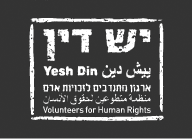Website policy We provide links to articles we think will be of interest to our supporters, informing them of issues, events, debates and the wider context of the conflict. We are sympathetic to much of the content of what we post, but not to everything. The fact that something has been linked to here does not necessarily mean that we endorse the views expressed in it.
|
 Author Mike Marqusee writes of a recent visit to East Jerusalem and Sheikh Jarrar. He says of Jerusalem: “The city is a metaphor, an object of longing, a place from which we are all exiled, a better world to which we all aspire. In some parts of the tradition Jerusalem is an ideal of social justice. The literalism of Zionism, and of many pro-Zionist Christians, is very much a modern, reductive twist. At Sheikh Jarrah, Silwan and elsewhere, it is thin cover for a naked land grab.”
 Click on the heading above for a summary of, and links to, this week’s main stories and analyses.
 Yesh Din – Volunteers for Human Rights, an Israeli NGO that monitors the investigation of offences against Palestinians, finds that very few ever reach the stage of an indictment. Failure to proceed is particularly high in the case of investigations into offenses of violence against Palestinians and damage to their property…
 Novelist Ian McEwan is in Israel to receive the Jerusalem prize for literature despite a strong campaign calling on him to refuse to go. Here he defends his decision while taking part in the weekly protest in Sheikh Jarrar and saying he intends to “make my own thoughts clear” when accepting the prize from Jerusalem’s mayor, Nir Barkat…
 A Human Rights Watch and Amnesty International film launch of “This Is My Land… Hebron”. Featuring interviews with both Israelis and Palestinians living in Hebron, as well as activists on both sides, members of the Israeli parliament and prominent Ha’aretz journalists, this film lifts the lid on Hebron as it is today – a city fraught with violence and hate…
 So, despite its formal opposition to Israeli settlements, Obama and the US decided to stand alone and veto a resolution at the Security Council condemning Israel’s settlement policy. 14 voted for the resolution, including Britain, Russia, Brazil, 1 against — and no abstentions.
Various commentators give their immediate reactions and assess the implications.
 “There are moments in world affairs that call for the suspension of disbelief,” write the editors of the Middle East Report Online. “At these junctures, caution ought to be suppressed and cynicism forgotten to let joy and wonderment resound.” The article “Red-White-and-Black Valentine” is just such a celebration of the Egyptian revolution. The second Mero article crossposted here, “Revolution and Counter-Revolution in the Egyptian Media” argues that “Access to and use of communication and information networks — cellular phone services; the Internet and new social media; TV and newspapers — was pivotal as events unfolded. ” In it Ursula Lindsey explores the possibilities and the contradictions involved in the new battle of the media; the army’s initial attempts to control, by shutting down the phone service, text messaging, the internet — and why that failed to abort the revolution…
Plus: Richard Silverstein writes about digital media in an age of revolution.
 A battle among genocide scholars as to how to characterise the dispossession of the Palestinians in 1948 is aired in the pages of the American paper, the Jewish Forward. It is an issue that has divided genocide scholars for some time, one of the factors that led to criticisms of the International Association of Genocide Scholars and the formation of the International Network of Genocide Scholars in 2005.
The arguments are complex…
 JfJfP signatory, Lynda Renham-Cook, speaks with the Amireh family who have fought against the construction of the Ni’lin wall – and been imprisoned and shot because of it.
 The Huwara checkpoint, one of the most notorious on the West Bank, has been removed. Is it a victory for MachsomWatch? Does it represent a change of policy? Not at all, says Susan Lourenco, a regular witness at the checkpoints, in an intereview in Ha’aretz
 Anthony Lerman looks at the TV series the Promise, of which two of the four episodes have now been screened: “That such a major and challenging series—in which the Israeli characters are drawn sympathetically and realistically, with not a hint of demonization—appears on one of the country’s mass audience television channels and is positively received throws an interesting light on what I believe are grossly exaggerated claims that London is the hub of international efforts to delegitimize Israel and that British Jews are subject to a constant barrage of media-driven anti-Zionist propaganda that borders on, or overlaps with, antisemitism…”
 A new play about the Hebron massacre in 1994, when Dr Baruch Goldstein, a Brooklyn-born Jewish settler, walked into the Tomb of the Patriarchs in Hebron and shot 29 Palestinians at prayer, has just opened at the Orange Tree Theatre in Richmond. It runs till 12 March. Michael Billington’s review in the Guardian gives it four stars…
 On Saturday night Israel’s most-watched news program on Channel 2, aired a 10-minute “Special Report” on the weekly demonstrations in the Palestinian village of Bil’in. Haggai Matar of Anarchists Against the Wall was there. Despite his best efforts, Palestinian protestors were written out of the story!
 M J Rosenberg writes: “Anyone who thought that the United States has learned anything from the various revolutions upturning the Arab world has another think coming. We didn’t.”
 Mitchell Plitnick is the former Director of the US Office of B’Tselem: The Israeli Information Center for Human Rights in the Occupied Territories and was previously the Director of Education and Policy for Jewish Voice for Peace. He is a widely published policy analyst. In this blog for JNews he looks at reactions to events in Egypt within the Jewish community in the US.
 Some wonderful writing by Thomas Friedman in Cairo: “[And] when young Egyptians looked around the region and asked: Who is with us in this quest [for freedom, dignity and justice] and who is not?, the two big countries they knew were against them were Israel and Saudi Arabia. Sad. The children of Egypt were having their liberation moment and the children of Israel decided to side with Pharaoh – right to the very end…”
 Click on the heading above for a summary of, and links to, this week’s main stories and analyses.
 Peace Now’s Settlement Watch has produced updated maps of settlements on the West Bank and in East Jerusalem. It is well-worth taking a closer look at the high-resolution PDF available for download.
 Ran Greenstein provides a nuanced analysis of the Israel/Palestine reality which he characterises as ‘apartheid of a special type’ – a unique system that combines democratic norms, military occupation, and exclusion/inclusion of extra-territorial populations. He argues further that one approach to challenging this system would be to foster a bi-nationalism that would accommodate members of both national groups as equals, and facilitate negotiation underpinned by the discourse and values of democracy, justice, equality and human rights, rather than those of diplomacy and statehood.
 A JfJfP statement of support for the Egyptian people and a short selection of articles on Egypt and the wider region.
|
Get Email Updates Enter your email address and click to subscribe - then check your inbox to customise your update preferences
 BSST is the leading charity focusing on small-scale grass roots cross community, anti poverty and humanitarian projects in Israel/Palestine
|




















